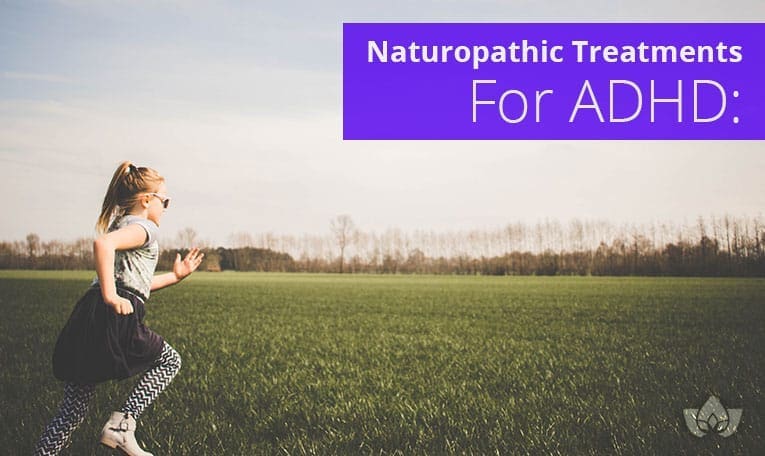
ADHD stands for attention deficit hyperactivity disorder.
It’s a condition that’s characterized by symptoms such as inattentiveness, impulsivity, and hyperactivity.
Symptoms differ from person to person.
ADHD was formerly called ADD, or attention deficit disorder.
Both children and adults can have ADHD, but the symptoms always begin in childhood.
Adults with ADHD may have trouble managing time, being organized, setting goals, and holding down a job.
ADHD is a common attention-related disorder that affects children and adults alike.
As a Mississauga naturopath, I’ve seen many different cases and have provided treatment both in person and through online therapy.
According to Statistics Canada, about 5% of Canadian children are diagnosed with ADHD, and about half of those cases will persist into adulthood.
So, if you don’t have ADHD yourself, chances are you know somebody who does.
Read on to find out more about these disorders from a naturopathic perspective.
What is ADHD?
ADHD (Attention Deficit Hyperactivity Disorder) is characterized by varying degrees of especially persistent symptoms of inattention, hyperactivity, and impulsivity.
There are three subtypes of ADHD:
- Predominately hyperactive/impulsive
- Predominately inattentive
- Combined hyperactive/impulsive and inattentive
The symptoms of each can present in a very mild manner and can also be incredibly severe.
However, they always interfere with normal development and daily functioning of the individual.
A diagnosis of ADHD typically requires that symptoms be present by the age of 12 and also be present in more than one setting.
In effect, a child will present symptoms both at home and at school.
ADHD, when left untreated, may persist into adulthood.
This can create difficulties concentrating in the workplace or with maintaining focus in social relationships.
What’s basically happening is that the neurotransmitters in the brain of someone with ADHD don’t exactly work in the same way as someone without ADHD.
It may also be the case that certain parts of the brain are sometimes less active or less developed.
Current research confirms that we don’t exactly understand the cause of ADHD, but there are certain risk factors that can increase your chances of being born with ADHD.
Keep reading to learn more about some of the risk factors associated with the development of ADHD.
What Are The Symptoms Of ADHD?
There are a number of different symptoms of ADHD, all of which can be lumped into three main categories.
These three categories are inattention, hyperactivity, and impulsivity.
Let’s take a more detailed look into each one.
Inattention
If your child has ADHD symptoms that fall under the inattention category, you might notice that they are easily distracted or forgetful.
They could gloss over details and often switch from one activity to another.
You might notice that your child doesn’t seem to listen when spoken to or appears to be uninterested.
Daydreaming is another common symptom and they might be easily confused if someone speaks to them while they’re not paying attention.
It could be difficult for them to stay focused on one task because they are easily bored if they don’t particularly enjoy that task.
This can make it hard for them to learn something new.
So they might struggle to focus their attention to organize and complete new tasks.
If your child has some of these symptoms, there’s a good chance they also have difficulty completing and handing in homework assignments.
They might also often lose the tools they need to complete tasks, such as pencils or books.
Ultimately, these symptoms make it harder for them to process information at the same speed as their classmates.
Hyperactivity
If your child has hyperactivity ADHD symptoms, they might:
- Fidget and squirm in their seats
- Talk nonstop
- Dash around, touching or playing with anything and everything in sight
- Have trouble sitting still during dinner, school, doing homework, and story time
- Be constantly in motion doing things like tapping, hair twirling or nail biting
- Have difficulty doing quiet tasks or activities
Impulsivity
If your child has ADHD symptoms under the category of impulsivity, they may:
- Be very impatient
- Have a hard time resisting temptation
- Blurt out inappropriate comments, show their emotions without restraint, and act without regard for consequences
- Take unnecessary risks
- Have difficulty waiting for things they want or waiting their turns in games
- Often interrupt conversations or others’ activities
What Are The Risk Factors For ADHD?
While the exact causes of ADHD remain unknown, we have identified several primary risk factors for its development.
One is heredity.
If your parents had ADHD, the odds are about even that you’ll end up struggling with it yourself.
And if one of your older siblings has it, you’ve got about a three in ten chance of having it.
The reason for this isn’t yet fully understood.
Another common cause relates to issues within a pregnancy.
You’re at higher risk for having ADHD if:
- You were born with a low birth weight
- You were born premature
- Your mother smoked, drank, or used drugs during pregnancy
- You suffered a head injury during delivery
- You were exposed to lead or pesticides
There is some suggestion that dopamine may play a role in this condition as well, but this research is in its early stages and much more needs to be done on the subject.
Naturopathic Treatments For ADHD
In the medical world, the most popular treatment for ADHD is the use of psychostimulant drugs, such as Ritalin.
Most respond well to the use of these drugs.
However, many families are concerned with the side effects of such drugs, both short term and long term.
Some of these side effects may include, but are not limited to:
- Anxiousness or nervousness
- Insomnia
- Stomach pain
- Nausea, dizziness, or vomiting
- Vision problems
- Loss of appetite and weight loss
- High blood pressure
- Headaches
As a result, complementary and naturopathic treatments for ADHD have become popular in recent years.
Here are a few examples of possible treatments that have been proven effective, as cited in a 2014 study by Bloch and Mulqueen.
1. Dietary Supplementation
Nutritional counseling is an important tool to help you or your child manage your ADHD symptoms.
This is because a number of different vitamins, minerals, and hormones have been shown to have varying degrees of effectiveness in improving the condition of those with ADHD.
Among these are:
Some for which initial research is promising but currently inconclusive include:
2. Herbal Supplements
A number of botanical herbal supplements have shown effectiveness in reducing the symptoms of ADHD, including:
- Ginkgo biloba
- St. John’s Wort (Hypericum perforatum)
- Pycnogenol
Book Your Appointment With The Mindful Healing Clinic Today
Do you think that you or your child may be struggling with ADHD?
Don’t want to go the pharmaceutical route but confused about where to turn?
If so, contact me, Dr. Maria Cavallazzi, at the Mindful Healing Clinic.
During your FREE introductory session, you’ll get a chance to ask questions about naturopathic treatments for ADHD and explain any of your health concerns.
From there we can talk about putting together a treatment plan designed to complement your medical treatments or develop an alternative path.
Book your appointment with The Mindful Healing Clinic today.
Until next time,
Dr. Maria Cavallazzi, N.D
Mindful Healing Naturopathic Clinic
Mississauga, ON L5M 1L7
(905) 819-8200
► https://g.page/MindfulClinicNaturopathic
Dr. Maria Cavallazzi is a medical doctor from Colombia where she practiced as a family physician for 8 years until she moved to Canada 16 years ago and became a naturopathic doctor in Mississauga.



